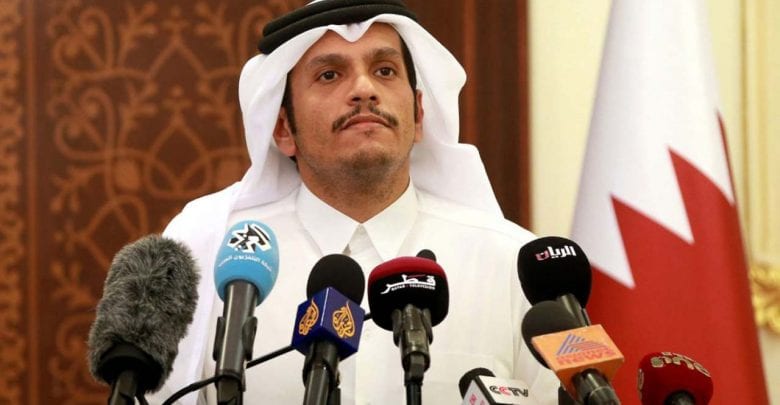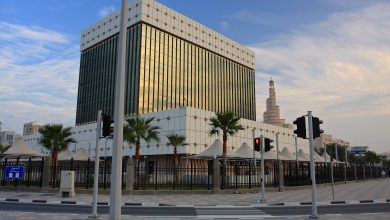
Time to end unfortunate chapter in Gulf history: FM
حان الوقت كي ينتهي هذا الفصل المؤسف في تاريخ الخليج
Doha: Deputy Prime Minister and Minister of Foreign Affairs H E Sheikh Mohamed bin Abdulrahman Al Thani affirmed that the State of Qatar is stronger than it was before the blockade, stressing that it is time to end this unfortunate chapter in the history of the Gulf. It is time for the blockading nations to abandon their delusions of victory, prioritize the security interests of the entire Middle East, he said.
In an article published in New York Times newspaper, H E the Deputy Prime Minister and Minister of Foreign Affairs said: “The past year Qatar has been subjected to a reckless and ill-considered blockade imposed by four countries: Saudi Arabia, Bahrain, the United Arab Emirates and Egypt”, noting that “these nations felt threatened by Qatar’s independent foreign policy and in response, they have closed our borders and barred flights to our country.”
“The blockading countries may have expected to bring Qatar to its knees. If that was their intention, their effort has clearly backfired. Today, Qatar is stronger than it was a year ago. Within 24 hours of the imposition of the blockade, we quickly established new sources and alternate, more sustainable supply routes for basic goods, like food and medicine.
“In the weeks and months that followed, we signed new, long-term contracts for economic cooperation, at the same time accelerating plans to diversify our economy by diminishing our reliance on our hydrocarbon resources,” He stressed.
“Last October, months into the blockade, the International Monetary Fund reported that Qatar’s economy was the fastest growing in the Gulf.”
H E the Deputy Prime Minister and Minister of Foreign Affairs said: “The blockade of Qatar, now widely viewed as instigated under false pretenses, has undermined the Middle East’s stability. By now it should be clear that there can be no “winners” in this dispute. It is, therefore, time for the blockading nations to abandon their delusions of victory, prioritize the security interests of the entire Middle East and end the blockade.”
He noted that Qatar believes that the Gulf states need to establish a new framework for advancing peace and security. “Historically, the Gulf Cooperation Council has played a stabilizing role in Gulf affairs. But the G.C.C. was never meant to serve as a regional court, an advocacy group or a policymaking body.”
The issues confronting the nations of the Arabian Peninsula require a broader platform for dialogue and negotiation, His Excellency said, adding, “Qatar’s government believes that a new regional pact, unencumbered by the recent rift, could bring back the positive leadership and authority that once existed and that this would help our region to address the economic and political challenges we face.”
He stressed that Qatar believes that the “current G.C.C. stalemate”, in particular, highlights the urgent need for such an agreement, adding “We hope that wisdom will prevail and that our neighbors will join us in creating a new mechanism to promote our collective security interests and advance the cause of peace.
“By restoring Gulf unity and establishing a new framework for conflict resolution, we can make our region, and the world, more stable and secure.”
“For more than 15 years the Middle East has been a region of turmoil and instability. Transnational terrorism, waves of displaced populations and seemingly intractable wars present global threats that affect countries far from the region.”
H E Deputy Prime Minister and Minister of Foreign Affairs Sheikh Mohammed bin Abdulrahman Al-Thani further added: “In Qatar, we believe that the crises in the Middle East are interconnected and require comprehensive solutions, and that peace and stability will be restored only when the region’s countries agree to work together to reach consensus on key challenges, including the destabilizing influence of sectarianism, rising youth unemployment and our common need to diversify our energy-dependent economies.”
His Excellency said: “But at a time when Arab allies should be united in facing the atrocity of the mass killings in Syria, the escalating war in Yemen, and the rebuilding of state institutions in Libya and Iraq, some regional players have chosen to pursue petty grievances and selfish ambitions that undermine our unity. Exhibit A: the blockade of my country.”
H E the Deputy Prime Minister and Minister of Foreign Affairs said that the Middle East remains in turmoil. The government of President Bashar al Assad has consolidated power in Syria, shifting the regional and geopolitical landscape; besieged Palestinians in Gaza have risen up in protest, focusing new attention on the need for a workable peace plan between the Palestinians and the Israelis; and Yemen is entering its third year of war, with tens of thousands already dead and no end in sight, he said, adding these issues are important to the people of the Arabian Peninsula, and all of them cry out for a united Arab voice.
H E Deputy Prime Minister and Minister of Foreign Affairs stressed that Qatar believes that the stakes are too high, and the time too limited, to focus on differences between and among the Arab states, pointing out that the administration in Washington clearly shares this view.
“My counterpart, Secretary of State Mike Pompeo, has stressed the importance of Gulf unity. President Trump has repeatedly expressed his desire to see the Gulf dispute resolved.” H E Deputy Prime Minister and Minister of Foreign Affairs said: “All agree it is time for this sorry chapter in Gulf history to come to an end.”
أكد سعادة الشيخ محمد بن عبد الرحمن آل ثاني نائب رئيس مجلس الوزراء وزير الخارجية، أن دولة قطر اليوم أقوى مما كانت عليه قبل الحصار، مشدداً على أنه حان الوقت لكي ينتهي هذا الفصل المؤسف في تاريخ الخليج، وأن تتخلى دول الحصار عن أوهام النصر وتعطي الأولوية للمصالح الأمنية للشرق الأوسط.
وأضاف سعادته، في مقال بصحيفة نيويورك تايمز الأميركية، أنه خلال العام الماضي، تعرضت دولة قطر لحصار «طائش وغير مدروس» فرضته أربع دول هي المملكة العربية السعودية والبحرين والإمارات العربية المتحدة ومصر، موضحاً أن هذه الدول «شعرت بأنها مهددة من قبل سياسة قطر الخارجية المستقلة، ورداً على ذلك، فقد أغلقوا الحدود ومنعوا الرحلات إلى قطر».
وتابع سعادته: «ربما توقعت دول الحصار أن تركع دولة قطر. إذا كانت هذه هي نيتهم، فإن جهدهم كان له نتائج عكسية»، مؤكداً أن قطر اليوم أقوى مما كانت عليه قبل عام، ففي غضون 24 ساعة من فرض الحصار، قامت دولة قطر باعتماد مصادر جديدة وطرق توريد بديلة وأكثر استدامة للسلع الأساسية مثل الغذاء والدواء، مشيراً إلى أنه تم التوقيع على عقود طويلة الأجل للتعاون الاقتصادي في الأسابيع والأشهر التالية، كما أنه تم تسريع الخطط لتنويع الاقتصاد من خلال تقليل الاعتماد على الموارد الهيدروكربونية.
وأوضح أنه في شهر أكتوبر الماضي، أي بعد أشهر من الحصار، أكد صندوق النقد الدولي أن اقتصاد قطر كان الأسرع نمواً في منطقة الخليج.
وأكد سعادة نائب رئيس مجلس الوزراء وزير الخارجية، أن الحصار المفروض على قطر، والذي ينظر إليه على أنه تم إثارته بتزوير كاذب، قد قوض استقرار الشرق الأوسط، مضيفاً «الآن يجب أن يكون واضحاً أنه لا يمكن أن يوجد فائزون في هذا النزاع، لذا حان الوقت لكي تتخلى دول الحصار عن أوهام النصر وتعطي الأولوية للمصالح الأمنية للشرق الأوسط بأكمله وتضع حداً للحصار». وقال إن دولة قطر تعتقد أن دول الخليج بحاجة إلى وضع إطار جديد لتعزيز السلام والأمن، لافتاً إلى أنه تاريخياً، كان مجلس التعاون الخليجي عامل استقرار في شؤون الخليج، ولكن المجلس لم يقصد به أن يعمل كمحكمة إقليمية أو مجموعة مرافعة أو هيئة لصنع السياسات. وأشار إلى أن القضايا التي تواجه دول شبه الجزيرة العربية تتطلب منصة أوسع للحوار والتفاوض، مضيفاً أن «حكومة قطر تعتقد أن اتفاقاً إقليمياً جديداً، غير مرتبط بالخلاف الأخير، يمكن أن يعيد القيادة والسلطة الإيجابية التي كانت موجودة سابقاً، وأن هذا من شأنه أن يساعد منطقتنا في التصدي للتحديات الاقتصادية والسياسية التي نواجهها».
وشدد سعادته على أن دولة قطر تؤمن بأن «المأزق الخليجي» يبرز الحاجة الملحة إلى مثل هذا الاتفاق، معرباً عن أمله «في أن تسود الحكمة وأن ينضم إلينا جيراننا في إنشاء آلية جديدة لتعزيز مصالحنا الأمنية الجماعية والنهوض بقضية السلام، حيث يمكننا أن نجعل منطقتنا والعالم أكثر استقراراً وأمناً من خلال إعادة وحدة الخليج وإقامة إطار جديد لحل الأزمة».
وذكر سعادته أن الجميع يتفق على أن الوقت قد حان لكي ينتهي هذا الفصل المؤسف في تاريخ الخليج.
وأوضح سعادة الشيخ محمد بن عبد الرحمن آل ثاني نائب رئيس مجلس الوزراء وزير الخارجية، أن الشرق الأوسط كان، لأكثر من 15 عاماً، منطقة اضطراب وعدم استقرار، وقد شكل الإرهاب العابر للحدود وموجات من السكان المشردين والحروب التي تبدو مستعصية، تهديدات عالمية تؤثر على البلدان البعيدة عن المنطقة.
وأضاف سعادته: «نعتقد في قطر، أن الأزمات في الشرق الأوسط مرتبطة وتتطلب حلولاً شاملة، وأن السلام والاستقرار لن يتم استعادتهما إلا عندما تتفق دول المنطقة على العمل معاً للتوصل إلى توافق حول التحديات الرئيسية، التي تشمل التأثير الطائفي المزعزع للاستقرار وارتفاع معدلات البطالة بين الشباب والحاجة المشتركة لتنويع اقتصاداتنا التي تعتمد على الطاقة».;



